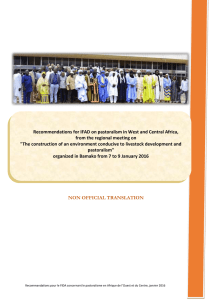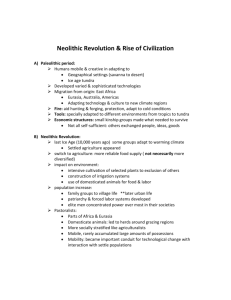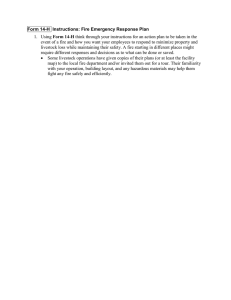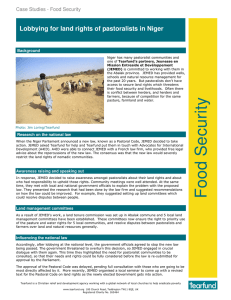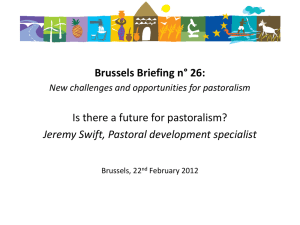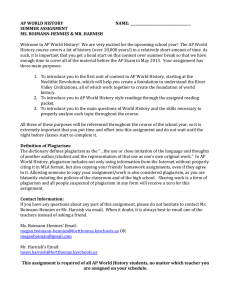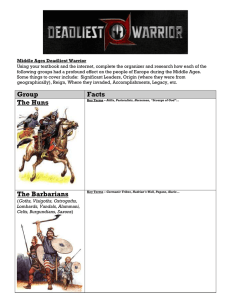Workshop of the Pastoralists Knowledge Hub on building an enabling
advertisement
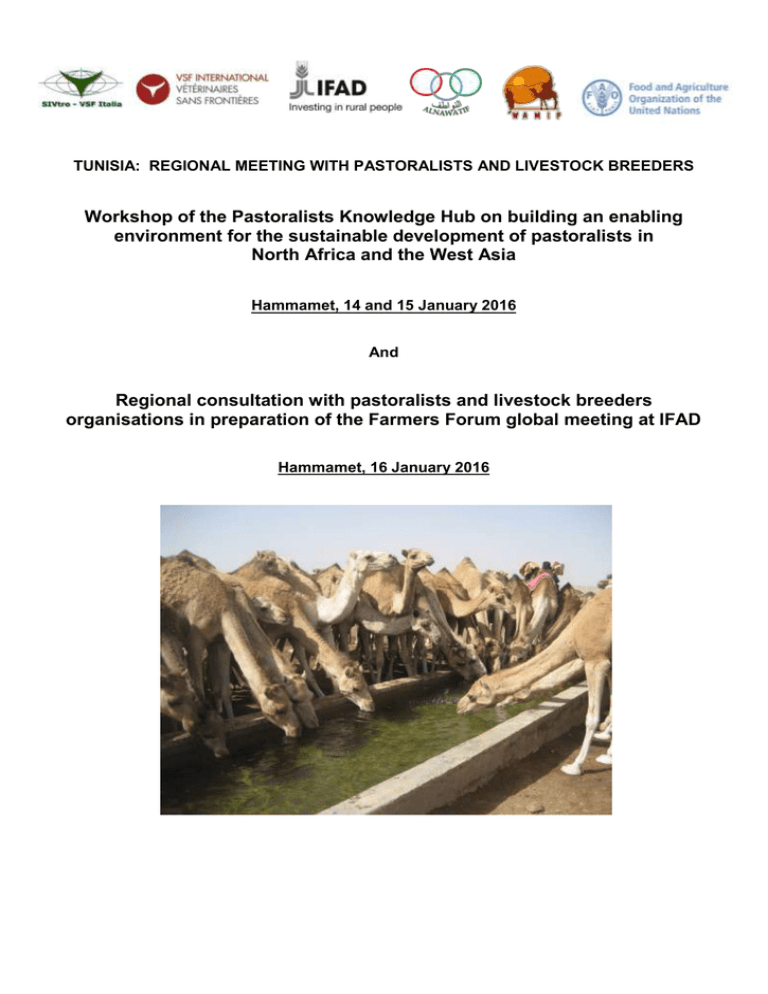
TUNISIA: REGIONAL MEETING WITH PASTORALISTS AND LIVESTOCK BREEDERS Workshop of the Pastoralists Knowledge Hub on building an enabling environment for the sustainable development of pastoralists in North Africa and the West Asia Hammamet, 14 and 15 January 2016 And Regional consultation with pastoralists and livestock breeders organisations in preparation of the Farmers Forum global meeting at IFAD Hammamet, 16 January 2016 1. CONTEXT OF THE REGIONAL WORKSHOPS There are several hundred million pastoralists around the world. They are important food producers and have a rich legacy of traditional knowledge. They rely on their livestock and their mobility to survive in the harshest environments. But they often fail to get the attention they deserve. Recently, a strong movement of pastoralists has been emerging. In December 2013, 120 pastoralist leaders representing communities in 48 countries gathered in Kiserian, Kenya, to demand that more effort be put into pastoral development. The international community and development actors increasingly recognize the value of pastoralism. Various initiatives aim to strengthen the capacities and participation of pastoralists. Two meetings of Northern African and Western Asian pastoralists will take place in Hammamet in mid-January 2016. The meetings will bring together pastoralist and livestock breeders’ organizations of this region to discuss pastoral and livestock development and generate recommendations on how to strengthen their capacities. The workshops will also provide the space for pastoralist organizations to organize themselves. The first workshop on the 14 and 15 January is jointly organized by the World Alliance of Mobile Indigenous Peoples (WAMIP), Vétérinaires Sans Frontières (VSF), Alnawatif Cooperative-Jordan and by the Pastoralist Knowledge Hub of the Food and Agriculture Organization of the United Nations (FAO). The second event is organized by Vétérinaires Sans Frontières (VSF) on behalf of International Fund for Agricultural Development (IFAD). Both workshops are separate but are organised back to back, because they have similar overall objectives of strengthening pastoralist development. The first workshop has a more political focus and aims to strengthen pastoralist organizations whereas the second event regards investment priorities, in particular in the field of knowledge, infrastructure. The two initiatives are further described below: 1) Pastoralist Knowledge Hub The Pastoralist Knowledge Hub is a platform bringing together pastoralist networks and organizations working with them in order to promote collaboration and to enhance pastoral development and pastoralist-friendly policy interventions. Coordinated by FAO, the Hub aims to give pastoralists a voice by strengthening their capacities and by linking their representatives to policy dialogue opportunities. The Pastoralist Knowledge Hub has three pillars: ● Knowledge repository: A database that classifies and provides access to literature on pastoralism. ● Pastoralist networks: A forum for pastoralist organizations to share knowledge and voice their concerns in policy making. ● Partners: A tool for alliance with key players on pastoralism, allowing dialogue, coordination and exploration of synergies, as well as to showcase work done in the field. The workshop (on 14 and 15 January) in North Africa and the West Asia is part of a series of seven regional workshops covering all major pastoral areas of the world, of which four have already been held in South Asia, Latin America, Europe and Central Asia. The Pastoralist Knowledge Hub is co-organising the workshop with VSF and WAMIP. WAMIP has focal points in each region. FAO has requested the focal point of West Asia, the "Alnawatif Cooperative-Jordan" to organize the workshop. WAMIP is a global alliance of nomadic peoples and communities practicing various forms of mobility as a livelihood strategy while conserving biological diversity and using natural resources in a sustainable way. WAMIP was created in an unofficial form by about 26 representatives of mobile peoples, tribes and communities from four continents gathered on the occasion of the 5th World Park Congress in Durban, South Africa, in September 2003. The representatives of the mobile people decided to form their own association, identified themselves as indigenous and expressed their solidarity with the larger and well-established indigenous and tribal peoples’ movement worldwide. The first WAMIP Congress was held during 15-18 September 2007 in Segovia, Spain. The participants included community elders, leaders and representatives of 50 different mobile indigenous communities from 20 different countries across five continents. During the Congress the newly constructed WAMIP Statutes were amended and adopted. The next general council of WAMIP met in 2010 at Mera, India during the Global gathering of Women Pastoralists (GGWP). The leadership and governance was reconstituted at Mera. The latest general council and Global Gathering was held in Kiserian, Kenya in 2013. At Kiserian gathering, WAMIP was restructured and decentralized into 9 regional alliances—North, Central, East and West Africa; Central, South, and West Asia; Latin America and Europe. Subsequently, each alliance undertook vision-building exercise and selected a focal point for each region. 2) The Famers’ Forum regional consultation with pastoralists and livestock breeders facilitated by VSF-International and supported by the International Fund for Agricultural Development (IFAD): The Farmers’ Forum (FAFO) at IFAD is a platform for consultations and dialogue on ways to “enable the rural poor to overcome poverty” and on IFAD operations. It was created in 2005. The FAFO is an on-going, bottom-up, process – not a periodic event – spanning IFADsupported operations on the ground and policy dialogue; It is a tripartite process involving farmers’ organizations, governments and IFAD; it is a space for consultation and dialogue focused on rural poverty reduction; it is an instrument for accountability of development effectiveness, in particular in the area of empowerment of rural poor people and their organizations; and an interface between pro-poor rural development interventions and the process of enhancing the capacity of farmers’ and rural producers’ organizations (including organizations of artisanal fishers, pastoralists, landless workers and indigenous peoples). The FAFO is guided by the principles of inclusiveness, pluralism, openness and flexibility; it is built on existing fora where possible, avoiding duplication in these cases; and it respects existing organizations and creating new spaces where needed. For more information visit http://www.ifad.org/farmer/ During the last meeting of the Farmers’ Forum held in February 2014, participants asked IFAD to organize a special session on pastoralism and livestock breeders at the Farmers' Forum 2016. To respond to this recommendation, IFAD mobilized resources to facilitate regional consultations with membership-based organizations of pastoralists and livestock breeders to inform the Special Session of the Farmers' Forum to be held on the 12 February 2016. The consortium of VSF-International was selected through a competitive process to facilitate the regional consultations. In North Africa and the West Asia, the regional consultation is facilitated by SIVtro-VSF Italy. The North Africa and West Asia consultation is part of the global consultation process (5 regional consultations: 2 in Sub-Saharan Africa, one in West Asia and North Africa, one on Latin America and one in Asia). The regional consultations will then lead to the Special Session with pastoralists and livestock breeders of the Farmers’ Forum that will be held in Rome on the 12th February 2016. Each regional consultation will focus on validating the findings of the mapping of pastoralists and livestock breeders organizations realised by VSF and its regional partners, it will be the basis for discussing IFAD business model, and about the opportunity for partnerships between IFAD supported initiatives and membership based organizations of pastoralists and livestock breeders. Finally, the regional consultation will be also the platform for preparing the messages of the participants of the regional consultation for the Special Session with pastoralists and livestock breeders of the Farmers’ Forum. Summing up, the consultations’ process is organized as follows: ● A mapping of stakeholders and a survey on pastoralists’ livelihood in each region (Western and Central Africa, Eastern & Southern Africa, Northern Africa & West Asia; Latin America; and Asia) ● The organization of 5 regional gatherings with representatives of membership-based pastoralists’ organizations and livestock breeders CSOs ● A FAFO 2016 Special Session to consult with pastoralists’ and livestock breeders organizations. In North Africa and the West Asia, SIVtro-VSF Italy is responsible for facilitating these consultations with the assistance of the Research & Development Team on Environment and Health (Faculty of Sciences and Techniques, Errachidia, Morocco), Africa 70 (Italian NGO that has projects in Morocco, Algeria and Mauritania), Egyptian NGO Support Centre (Egypt) and VSF Germany (Sudan). 2. OBJECTIVES OF THE TWO REGIONAL WORKSHOPS The overall objective of the regional workshops – composed of two legs, one related to the consultation for the Farmers’ Forum process at IFAD and one to the Pastoralists’ Knowledge Hub - is to support the pastoralists’ and livestock breeders’ representation process in policy dialogues, as well as to identify the achievements and the current major challenges that remain and to agree on policy and investment priorities, in particular in the field of knowledge, infrastructure and services. The workshops will aim to create opportunity to contribute to the design of pastoral related policies and programmes, influence the future implementation of proactive and coherent policies that contribute to enhancing the adaptability and improve the economic and social viability of pastoral systems in North Africa and West Asia in a regional perspective. The specific objectives of the two regional workshops are: A. Map existing pastoralist stakeholders, reinforce a regional mechanism of pastoralists’ civil society, based on an analysis of existing policies, investments and frameworks; B. Assess achievements and identify remaining challenges; C. Determine priorities for pastoral knowledge development and communication opportunities with other actors (including the use of ICTs); D. Engage partners and stakeholders in a regular and informed dialogue, in order to establish an action plan to strengthen the pastoral voice at global level; E. Create/strengthen a (horizontal) network between the pastoralists and their representatives in the region (South-South exchanges); F. Discuss and identify specific recommendations for the Farmers' Forum, in order to provide guidance to IFAD for an effective collaboration with civil society in the framework of its investment projects in pastoral areas of the region. 3. PARTICIPANTS Participants of the two regional workshops will include: Representatives of membership based pastoralists and livestock breeders organisations Practicing pastoralists - (even if they do not belong to a formal organization; ex. community leaders/representatives) IFAD partners Supporting structures working on pastoralism in North Africa and the West Asia (NGOs, research institutions, etc.) Representatives of Veterinary Services National Agricultural Research Centres Public authorities 4. AGENDAS Workshop of the Pastoralists Knowledge Hub on building an enabling environment for the sustainable development of pastoralists in North Africa and the West Asia Thursday, 14th Jan 14:00 – 14:30 Arrival and quick lunch PART I: General introduction of the workshops Goals: participants get to know the organizers and each other and understand the purpose of the meeting 14:30 – 15:30 Opening ceremony (5min) Brief introduction of organizers (VSF, WAMIP) (5min) Presenting the purpose and objectives of the first event (first two days) (20min) Brief introduction of participants by country (20min) PART II: Mapping of pastoralist and livestock breeder stakeholders in North Africa and the West Asia Goals: 1) communicating the mapping results 2) validating and enlarging the list of pastoralist organizations 15:30 – 16:00 Introduction to this session (5min) Groups organized by countries: Groups draw on flip charts a map of their county showing 1) The name and location of their organization and other organizations they know 2) The location and names of the communities they work with (20 min) 16:00 – 16:15 Coffee and tea break 16:15 – 19:00 In plenary: Graphical presentation of the mapping results done by VSF and WAMIP via video projector, country by country and validation of the results by all the participants based on their group work - new organizations and communities will be added to the mapping results (max. 10 min per country + 5 min break) Friday 15th January PART III: Key issues for pastoralism in North Africa and West Asia and policy recommendations Goal: identifying challenges and opportunities on pastoralism and giving recommendations to policy makers 8:00 – 8:45 Breakfast 9:00 – 10:15 In plenary: 10:15 – 11:15 Presentation of PKH initiative and conclusions of regional pastoralist consultations in Asia, Europe, Latin America (20 min) Presentation of WAMIP, structure, activities, history (20 min) Presentation of VSF (15 min) OIE presentation on their work with pastoralists and animal health (15 min) Group work on thematic topics regarding challenges, opportunities and recommendations: WG1: Policy, mobility and land issues WG2: Social-cultural aspects WG3: Economics of pastoralism WG4: Natural resource management (60min) 11:15 – 11:30 Coffee break 11:30 – 13:00 In plenary: Each working group presents the results of its group, including challenges and proposed solutions (10 min per group + 5 min discussion) Summary of results (10 min) 13:00 – 15:00 Lunch and prayers Part IV: Strengthening the mechanisms of pastoralist civil society Goals: 1) discussing and agreeing on goals, structures and first steps of a regional network for North Africa and West Asia 2) presenting and agreeing on the declaration 15:00 – 16:00 Introduction to this session (5min) Group work (5 groups): Groups brainstorm on the 1) objectives, 2) structure, communication and operational procedures of a regional pastoralist network, 3) activities and 4) first steps to set up such a network (55min) 16:00 – 16:15 Coffee break 16:15 – 17:30 In plenary: Presentation by WAMIP suggesting 1) objectives, 2) structure, communication and operational procedures of a regional pastoralist network, 3) activities and 4) first steps to set up such a network (15min) Discussion of the presentation and agreeing on an action plan (60min) 17:30 – 18:30 In plenary: presenting and agreeing on the declaration (60min) 18:30 – 19:00 Closure of workshop 19:00 – 20:00 Dinner After dinner Free time Regional Consultation with Pastoralists and livestock breeders organizations in preparation of the Farmers Forum at IFAD Saturday, 16th Jan The objective of the regional consultation is to understand the perceptions of pastoral and livestock breeders organizations on policies, programs and investments (national, regional, international) and of provide guidance for strengthening partnerships between pastoralists and livestock breeders organizations and IFAD supported programs in the region. Discussions will focus on the organization and recommendations for FAFO Special Session 12th February 2016 and future IFAD partnerships with pastoralists’ and livestock breeders' organizations of the region. The consultation will also also discuss participants for main Farmers Forum session (15th and 16th February 2016). The participation to the regional consultation is for pastoralists’ and livestock breeders' organizations, VSF and IFAD partners 9.00 – 10.30 10:30 - 11:00 In plenary: Opening of IFAD and VSF explaining the purpose of the regional consultation, the structure of the agenda, the expected outputs. (15 minutes) Presentation of preliminary findings from the surveys conducted by SIVtroVSF Italy and validation of the mapping (presentation and plenary discussion) (15 minutes) IFAD business model, how it operates at country level and the FAFO process (presentation and plenary discussion) 20 minutes IFAD and its support to pastoralists and livestock herders: experience from case studies from Sudan and Tunisia (presentation and plenary discussion) 40 minutes Explanation of the issues to be discussed in working group session in the afternoon, expected deliverables, moderation and reporting from the WGs. Creation of the groups. 11:00 - 11:15 11.15 -13.00 Coffee and tea break WG 1 : Identification of priority areas for investments in pastoralism for livestock breeders and pastoralists and recommendations for the partnership with IFAD. WG 2: Identification of priority areas for policy dialogue, advocacy and other policy initiatives in support of organizations of pastoralists and livestock herders. Recommendations for the partnership with IFAD. WG 3: Discussion on how organizations of pastoralists and livestock herders can be associated at the different stages of IFAD business model – country strategy development, project design, projects implementation and supervision, and overall IFAD programme implementation. WG 4: to be defined with participants 13.00 -14.00 Lunch 14.00 - 15.30 Continuation of the working group session 15.30 - 16.30 Coffee and tea break for participants (aside the core drafting team) Rapporteurs, VSF, IFAD and the 4 representatives that would join the FAFO Special Session in Rome (core drafting team) will prepare short reports that will summarise the findings from the working group sessions. The core drafting team will be also starting the drafting of the final statement of the regional consultation. Each working group will present recommendations for FAFO Special Sessions and IFAD future engagements with Pastoralist and livestock breeders organizations Discussion and validation of the final recommendations for regional consultation 16.30 – 17.30 17.30 – 18.45 Conclusion of the regional consultation
